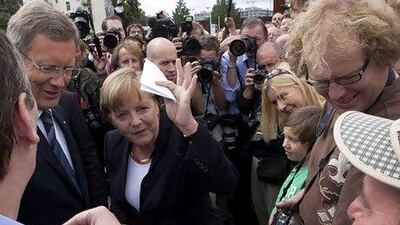BERLIN // Angela Merkel, the German chancellor, is likely to face pressure from Nicolas Sarkozy, the French president, to drop her opposition to eurobonds at their economic summit in Paris today, and there are growing signs that she might relent - not immediately, but eventually.
The idea of issuing common euro-zone debt is more politically risky for Mrs Merkel than any of the bailout packages she has reluctantly signed up to since the euro crisis erupted last year. Key members of her centre-right coalition are bitterly opposed to the move that they say would turn the euro zone into a "transfer union", with German taxpayers subsidising nations that do not keep their budgets in order.
The pro-business Free Democratic Party (FDP), the junior coalition partner to Mrs Merkel's Christian Democrats, has steadfastly ruled out eurobonds, and many members of her own party are also against them.
The leader of the FDP, Philipp Rosler who is also the economy minister, told Die Weltyesterday that eurobonds "lead to equal interest rates in the whole euro zone and thereby undermine the incentives for a solid budget and economic policy in the member states".
Mrs Merkel cannot afford to spurn the FDP ahead of the parliamentary vote in September on the July 21 agreement by euro-zone leaders to widen the scope of the €440 billion (Dh2.321 trillion) rescue fund.
If coalition rebels deprive her of her own parliamentary majority in that vote, it would be a stinging political blow that would probably force her to call an early election. Over the weekend, the finance minister of Italy, Giulio Tremonti, called for the introduction of eurobonds.
"We wouldn't be where we are now if we had had eurobonds," he said. Senior EU officials also back the idea, including the chairman of the group of euro finance ministers, Jean-Claude Juncker, and the EU economic and monetary affairs commissioner, Olli Rehn. They argue that the bonds would restore stability by stopping speculative attacks on the debt markets of individual euro member states.
But German politicians and economists complain that eurobonds would sharply increase Germany's borrowing costs, by between €10bn and €47bn a year according to various estimates. The interest rates payable on eurobonds would be higher than on German debt because less creditworthy nations would be included as guarantors.
But Mrs Merkel, as the leader of Europe's strongest economy and head of a party that prides itself on its commitment to European integration, cannot afford to let the single currency break apart. There is a growing realisation in Berlin that some form of common debt issuance may be the only way to save the euro zone.
German government officials have been emphasising that preserving the currency bloc has "total priority" for Germany, and Wolfgang Schaeuble, the German finance minister, hinted on Monday that Berlin may be willing to accept eurobonds if strict conditions were met.
"I'm ruling out eurobonds for as long as member states pursue their own financial policies and we need differing interest rates as a way to provide incentives and the possibility of sanctions, to enforce fiscal solidity," said Mr Schaeuble.
That comment was interpreted less as a categorical "nein" to eurobonds than as a statement of conditions under which Mr Schaeuble would sign up to them.
Mr Sarkozy, meanwhile, is likely to have dropped his own opposition to eurobonds after a week of market speculation about a possible downgrading of France's credit rating.
There has never been much personal chemistry between the impulsive, brash French leader and his reserved, cool German counterpart. The debt crisis has been exacerbated in part by their past failure to agree on a fundamental strategy to tackle it.
Disagreements in the run-up to Tuesday's meeting highlighted the differences between the two leaders. Berlin was reported to have been irked by Mr Sarkozy's portrayal of the summit as a spontaneous crisis meeting. Mrs Merkel's press office on Thursday released a statement saying the get-together had already been planned after the July 21 euro summit, with the aim of strengthening economic governance in the euro bloc.
Yet again, Mr Sarkozy's urgent tone was seen contrasting with Mrs Merkel's desire to play down the crisis.
The eyes of Europe will be on today's meeting. Mrs Merkel cannot afford to let herself be browbeaten by Mr Sarkozy in the way he did last October in the French seaside resort of Deauville, when he persuaded her to drop her demand for automatic sanctions on countries that breach EU debt rules.
She will not give in so easily this time, with her domestic political standing at stake. The two leaders are unlikely to announce the introduction of eurobonds. But their meeting could herald steps towards closer fiscal coordination that may in future lead to such bonds - as the only way left to save the currency.

